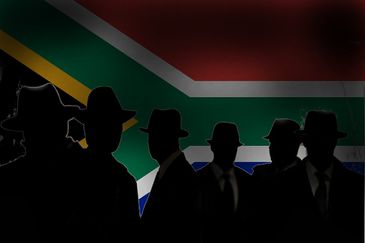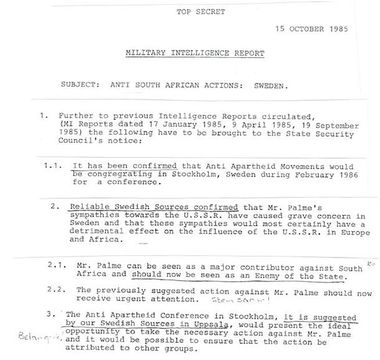Difference between revisions of "South Africa/Deep state"
m |
m (nukes mentioned twice) |
||
| Line 50: | Line 50: | ||
The [[Bureau for State Security]] (BOSS) was the main South African state intelligence agency from 1969 to 1980. | The [[Bureau for State Security]] (BOSS) was the main South African state intelligence agency from 1969 to 1980. | ||
| − | + | ||
=== 1980s === | === 1980s === | ||
| Line 61: | Line 61: | ||
{{FA|South Africa/Nuclear weapons}} | {{FA|South Africa/Nuclear weapons}} | ||
| − | South Africa | + | South Africa developed [[South Africa/Nuclear weapons|nuclear weapons]]. Allegedly this was only 10 nuclear bombs, which the apartheid government reportedly disposed of in the early 1990s. Their fate however remains disputed. (See [[David Kelly]]). |
| + | |||
| + | It also developed [[South Africa/Biological weapons|biological weapons]], which were used in an attempt to decimate the black population. | ||
==21st Century == | ==21st Century == | ||
Latest revision as of 10:52, 7 April 2023
(Deep state) | |
|---|---|
 | |
| Abbreviation | SA/DS |
| Headquarters | South Africa |
| Interest of | Tina Joemat-Pettersson, Cameron Mackenzie, Geoff Makhubo, Mpho Moerane |
| Exposed by | Mark Minnie |
| The South African deep state was installed by the Milner Group and anwered to London. The group hosted many meetings of Le Cercle and is believed to have carried out assassinations for the Supranational Deep State. | |
The South African deep state was installed by the Milner Group before the country was given nominal independence an and racism was institionalised in the apartheid policy. The group hosted many meetings of Le Cercle. A document which surfaced in 2014 suggested that they may have instigated the Olof Palme Assassination.[1]
Contents
History
As a British colony, South Africa was initially important because of its strategic position in connection to the sea lane to East Asia. This faded in importance after the digging of the Suez canal, but the country was found to have gold, diamonds and other minerals in large quantities.
“Alfred Milner organized and developed a talented coterie of Oxford graduates inside his South African administration, men who by 1914 held critical positions of power in the City, the Conservative Party, the Civil Service, major newspapers and academia. Carroll Quigley specifically dedicated a chapter of his seminal Anglo-American Establishment to this "Milner's Kindergarten", the men who rose to high office in government, industry and politics. He appointed, trained and developed his chosen men to drive forward the Secret Elite agenda with conviction.”
Jim Macgregor, Gerry Docherty (2017) [2]
20th century
Although it was given nominal independence after the South Africa Act 1909 which creating the Union of South Africa on 31 May 1910, the country remained under the firm control of the European educated and descended group which had ruled it as a colony. Patrick Duncan, for example, a member of the Milner Group, was made Governor-General of South Africa.
1900s
Milner's Kindergarten was an influential group of UK colonial administrators, from 1901-1910.
1910s
The Afrikaner Broederbond was an all white, all male Afrikaner-speaking (i.e. not English-speaking) deep state group that controlled South Africa since it was set up by H. J. Klopper, H. W. van der Merwe, D. H. C. du Plessis and Rev. Jozua Naudé in 1918.
In the years between 1948 and 1994, many prominent figures of South African political life, including all all Prime Minsters and State Presidents, and as well as influential government ministers, church leaders, academics, professionals, military, intelligence and police officers, were members of the Broederbond,[3] Most of the secret chairmen were academics and university leaders.
Apartheid
- Full article: Apartheid
- Full article: Apartheid
The colonial mindset was legally entrenched by an openly racist legal system named Apartheid, with only token efforts towards equality. This disenfranchised the majority South African population and attracted worldwide criticism, leading to diplomatic isolation. The South African deep state was active in maintaining this system, and engaged in brutal repression of critics and activists promoting a more genuinely representative democracy. During the Apartheid era 1948-1994, the Afrikaner Broederbond was the core of the Boer deep state.
WW2
1950s
1960s
1970s
The diplomatic isolation of the apartheid government meant that global diplomatic contacts were highly valuable. The mentality of most members of Le Cercle meant that the apartheid government was no a barrier to collaboration, which lead to South Africa contributing money to the Cercle and hosting several of its meetings. This connection may have been important in the assassination of Olof Palme. Attendees included billionaire businessman Anton Rupert.
Muldergate was a South African political scandal involving the Department of Information. It brought down Connie Mulder and South African Prime Minister B. J. Vorster.[4]
The Bureau for State Security (BOSS) was the main South African state intelligence agency from 1969 to 1980.
1980s

A document was published online in 2018 which supported the thesis that Olof Palme was assassinated by South African spooks, possibly contracted through Le Cercle.[5]
End of apartheid
After years of economic and cultural sanctions, the apartheid government handed over official political power,[When?] after agreeing a Truth and Reconciliation Commission which guaranteed immunity to those fully admitted past crimes.
- Full article: South Africa/Nuclear weapons
- Full article: South Africa/Nuclear weapons
South Africa developed nuclear weapons. Allegedly this was only 10 nuclear bombs, which the apartheid government reportedly disposed of in the early 1990s. Their fate however remains disputed. (See David Kelly).
It also developed biological weapons, which were used in an attempt to decimate the black population.
21st Century
2000s
2010s
In May 2009, President Jacob Zuma created the State Security Agency.
Mark Minnie was a detective-turned-author who became interested in paedophilia networks at the top of the South African government. He collaborated with Chris Steyn to write The Lost Boys of Bird Island, published on 5 August 2018. This gave details of child rape and murder by key figures in the last apartheid government. Minnie was shot dead on 14 August. The South African police reported that it was a suicide, a claim that was widely disbelieved.[6]
South African Reserve Bank
- Full article: South African Reserve Bank
- Full article: South African Reserve Bank

Unlike most central banks, the South African Reserve Bank is privately owned. Although it has its own facility for printing bank notes, it stated publicly after the exposure of Western Global Airlines N545JN that it also uses money printed abroad "as part of [its] contingency plans".[7]
Exposure
In the 1990s the Truth and Reconciliation Commission exposed many workings of the South African deep state.
South African documents
After a discovery in the Department of International Relations and Co-operation archive in Pretoria,[8] some South African diplomatic documents relating to Le Cercle emerged on the internet in 2017.[9][10][11]
Events carried out
| Event | Location | Description |
|---|---|---|
| Muldergate | South Africa | South African political scandal involving the Department of Information |
| Olof Palme/Assassination | Sweden Sveavägen Tunnelgatan Stockholm | A "lone nut", Christer Pettersson, was blamed but his conviction was overturned. After a document surfaced implicating the Apartheid South Africa in the assassination, in 2020 the Swedish police blamed the assassination on a different, already deceased, "lone nut". |
Examples
| Page name | Description |
|---|---|
| Afrikaner Broederbond | Deep state organization. Many prominent figures of South African life, including all leaders of the government, were members of the Afrikaner Broederbond. |
| Milner's Kindergarten | British administrators, front organisation for Milner's Society of the Elect |
References
- ↑ http://www.thelocal.se/20140225/millenium-author-tracked-south-african-palme-killer
- ↑ Prolonging The Agony p. 7
- ↑ http://africanhistory.about.com/library/glossary/bldef-broederbond.htm
- ↑ http://www.sahistory.org.za/pages/library-resources/articles_papers/information-scandal.htm
- ↑ https://gosint.wordpress.com/2018/03/12/olof-palme-south-african-spies-likely-murdered-sweden-prime-minister/
- ↑ https://www.bbc.com/news/world-africa-45195756
- ↑ http://www.sanews.gov.za/south-africa/reserve-bank-working-zim-authorities-consignment-release
- ↑ https://www.dailymaverick.co.za/article/2017-10-24-declassified-apartheid-profits-le-cercle-the-phantom-profiteers/
- ↑ https://www.scribd.com/document/362409317/3-1984-Le-Cercle-Meeting-in-Stellenbosch
- ↑ https://www.scribd.com/document/362409160/2-Madrid-Embassy-Le-Cercle-Meeting-to-Access-Reagan
- ↑ https://www.scribd.com/document/362408855/1-Taswell-Report-on-1977-Le-Cercle-Meeting
